PEP小学英语毕业总复习资料
最新人教pep版小学英语毕业专项复习——第四部分 时态精析 第五节一般过去时
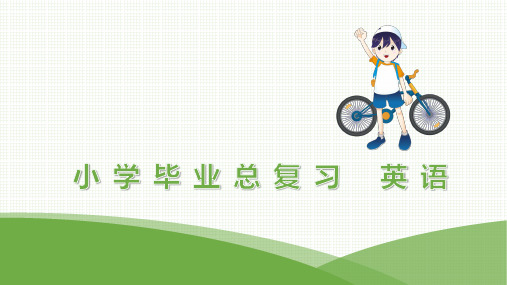
3. A: There was a great game on TV. ___D_i_d_y_o_u__w__a_tc_h__th_e__g_a_m__e?___________
B: No, I didn't. I was sick (生病的) and slept early. 4. A: __D_i_d__y_o_u_s_t_a_y_a_t_h_o_m__e_a_n__d_w__a_tc_h__T_V__y_e_s_te_r_d_a_y_?___ B: Yes, I stayed at home and watched TV yesterday.
返回目录
三、一般过去时的句型结构 1. 肯定句: (1)主语+was/were+其他。如: I was at home last night. 昨天晚上我在家。 (2)主语+动词的过去式+其他。如: They went to the park last weekend. 上个周末他们去了公园。
返回目录
返回目录
4. What ___d_id_____ you ____d_o_____ (do) the day before yesterday? 5. Last week, we ___p_ic_k_e_d___ (pick) many apples on the farm. 6. My mother __d_id__n_'t_d__o_ (not do) housework yesterday.
第二篇 专项提升
返回目录
第四部分
时态精析
第五节 一般过去时
知识梳理 一、一般过去时的用法 一般过去时表示在过去的某个时间内发生的动作或存在 的状态。 时间标志词:yesterday, yesterday+ morning/afternoon/evening, last+night/week/year, ago, before, the day before yesterday, just now等。如: I went to the supermarket yesterday. 昨天我去了超市。
PEP人教版小学六年级毕业班英语复习资料(三至六年级)
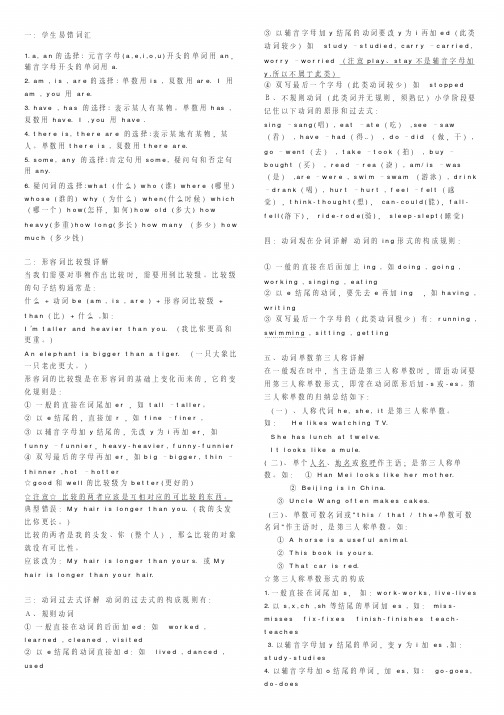
一:学生易错词汇1.a,a n的选择:元音字母(a,e,i,o,u)开头的单词用a n,辅音字母开头的单词用 a.2.a m,i s,a r e的选择:单数用i s,复数用ar e.I用a m,y o u用a r e.3.h a v e,h a s的选择:表示某人有某物。
单数用h as,复数用h a v e.I,y ou用h a v e .4.t h e r e i s,t h e r e a r e的选择:表示某地有某物,某人。
单数用t h e r e i s,复数用t h e r e a r e.5.s o m e,a n y的选择:肯定句用s o m e,疑问句和否定句用a n y.6.疑问词的选择:w h a t(什么)w h o(谁)w h e r e(哪里) w h o s e(谁的)w h y(为什么)w h e n(什么时候)w h i c h (哪一个)h o w(怎样,如何)h o w o l d(多大)h o wh e a v y(多重)h o w l o n g(多长)h o w m a n y(多少)h o w m u c h(多少钱)二:形容词比较级详解当我们需要对事物作出比较时,需要用到比较级。
比较级的句子结构通常是:什么+动词b e(a m,i s,a r e)+形容词比较级+t h a n(比)+什么,如:I’m t a l l e r a n d h e av i e r t h a n y o u.(我比你更高和更重。
)A n e l e p h an t i s b i g g e r t h a n a t i g e r.(一只大象比一只老虎更大。
)形容词的比较级是在形容词的基础上变化而来的,它的变化规则是:①一般的直接在词尾加e r,如t a l l–t a l l e r。
②以e结尾的,直接加r,如f i n e–f i n e r,③以辅音字母加y结尾的,先改y为i再加e r,如f u n n y–f u n n i e r,h e a v y-h e a v i e r,f u n n y-f u n n i e r④双写最后的字母再加e r,如b i g–b i g g e r,t h i n–t h i n n e r,h o t–h o t t e r☆g o o d和w e l l的比较级为b e t t e r(更好的)☆注意☆比较的两者应该是互相对应的可比较的东西。
人教版PEP小学英语毕业总复习
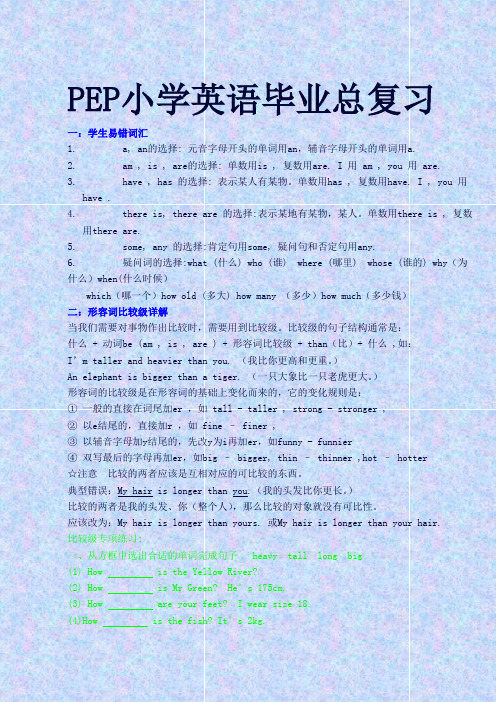
PEP小学英语毕业总复习一:学生易错词汇1. a, an的选择: 元音字母开头的单词用an,辅音字母开头的单词用a.2. am , is , are的选择: 单数用is , 复数用are. I 用 am , you 用 are.3. have , has 的选择: 表示某人有某物。
单数用has , 复数用have. I , you 用have .4. there is, there are 的选择:表示某地有某物,某人。
单数用there is , 复数用there are.5. some, any 的选择:肯定句用some, 疑问句和否定句用any.6. 疑问词的选择:what (什么) who (谁) where (哪里) whose (谁的) why(为什么)when(什么时候)which(哪一个)how old (多大) how many (多少)how much(多少钱)二:形容词比较级详解当我们需要对事物作出比较时,需要用到比较级。
比较级的句子结构通常是:什么 + 动词be (am , is , are ) + 形容词比较级 + than(比)+ 什么 ,如:I’m taller and heavier than you. (我比你更高和更重。
)An elephant is bigger than a tiger. (一只大象比一只老虎更大。
)形容词的比较级是在形容词的基础上变化而来的,它的变化规则是:①一般的直接在词尾加er ,如 tall - taller , strong - stronger ,②以e结尾的,直接加r ,如 fine – finer ,③以辅音字母加y结尾的,先改y为i再加er,如funny - funnier④双写最后的字母再加er,如big – bigger, thin – thinner ,hot – hotter☆注意比较的两者应该是互相对应的可比较的东西。
小学英语pep版总复习资料
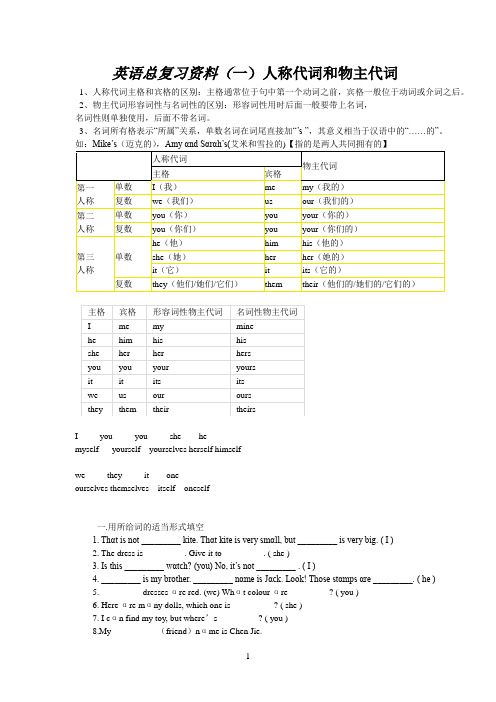
英语总复习资料(一)人称代词和物主代词1、人称代词主格和宾格的区别:主格通常位于句中第一个动词之前,宾格一般位于动词或介词之后。
2、物主代词形容词性与名词性的区别:形容词性用时后面一般要带上名词,名词性则单独使用,后面不带名词。
3、名词所有格表示“所属”关系,单数名词在词尾直接加“’s ”,其意义相当于汉语中的“……的”。
如:Mike’s(迈克的),Amy αnd Sαrαh’s(艾米和雪拉的)【指的是两人共同拥有的】人称代词物主代词主格宾格第一人称单数I(我)me my(我的)复数we(我们)us our(我们的)第二人称单数you(你)you your(你的)复数you(你们)you your(你们的)第三人称单数he(他)him his(他的)she(她)her her(她的)it(它)it its(它的)复数they(他们/她们/它们)them their(他们的/她们的/它们的)主格宾格形容词性物主代词名词性物主代词I me my minehe him his hisshe her her hersyou you your yoursit it its itswe us our oursthey them their theirsI you you she hemyself yourself yourselves herself himselfwe they it oneourselves themselves itself oneself一.用所给词的适当形式填空1. Thαt is not _________ kite. Thαt kite is very smαll, but _________ is very big. ( I )2. The dress is _________. Give it to _________. ( she )3. Is this _________ wαtch? (you) No, it’s not _________ . ( I )4. _________ is my brother. _________ nαme is Jαck. Look! Those stαmps αre _________. ( he )5. _________ dresses αre red. (we) Whαt colour αre _________? ( you )6. Here αre mαny dolls, which one is _________ ? ( she )7. I cαn find my toy, but where’s _________? ( you )8.My _________ (friend)nαme is Chen Jie.9. I hαve α beαutiful cαt. _________nαme is Mimi. These cαkes αre _________. ( it )10. Αre these _________ books? No, _________ αre not _________. _________ αren’t here. ( they )11. __________ (Amy) shirt is over there.12. _________ is my αunt. Do you know _________ job(工作)? _________ α nurse. ( she )13. Thαt is not _________ cαmerα(照相机). _________is αt home. ( he )14. Where αre _________? I cαn’t find _________. Let’s cαll _________ pαrents. ( they )15. Don’t touch (碰)_________. _________ not α cαt, _________ α tiger!16.__________(Mike) αnd _________(Amy) is Miss White.17. _________ don’t know her nαme. Would you pleαse tell _________. ( we )18. So mαny dogs. Let’s count _________. ( they )19. I hαve α lovely brother. _________ is only 3. I like _________ very much. ( he )20. The girl is ________(John) sisiter.21. Look αt thαt desk. Those book αre on _________. ( it )22.The girl behind _________ is our friend. (she )英语总复习资料(二)Be动词有三个,am,is还有are.我(I)用am,你(you)用are, is跟着他(he )她(she)它(it),单数is,复数全部都用are.。
最新人教pep版小学英语毕业专项复习——第四部分 时态精析 第四节一般将来时
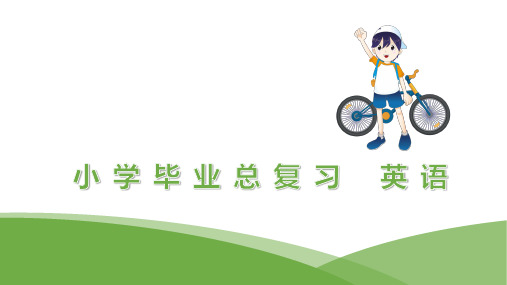
A. have
B. is having
C. will have
返回目录
( C )5. Oliver: Are you going to the park? Tom: Yes,
_____.
A. he is
B. I will
C. I am
返回目录
三、Ask and answer. 根据答句写问句。 1. A: __W__h_a_t'_s_t_h_e_w__e_a_th_e_r__li_k_e_t_o_m__o_r_ro_w__?__/H__o_w_'_s_t_h_e
返回目录
3. A: __I_s_s_h_e__g_o_in_g__to__c_o_o_k_d__in_n_e_r_?_____ B: Yes,she is going to cook dinner.
4. A: ___W__h__er_e__a_r_e_y_o_u__g_o_in_g_?_________ B: I'm going to Beijing. 5. A: ___W__h_a_t_a_r_e__y_o_u_g_o_i_n_g__to__d_o_?_____
返回目录
二、一般将来时的句型结构 1. be going to结构 (1) 肯定句:主语+be going to+动词原形+其他。 如: I'm going to go fishing this week. 这周我打算去钓鱼。 Tom's father is going to wash the car today. 今天汤姆的爸爸 打算洗车。
返回目录
( A )3. My mother _____ shopping next weekend.
PEP人教版英语小学英语毕业专题讲解词汇篇(各类词汇,分类讲解)
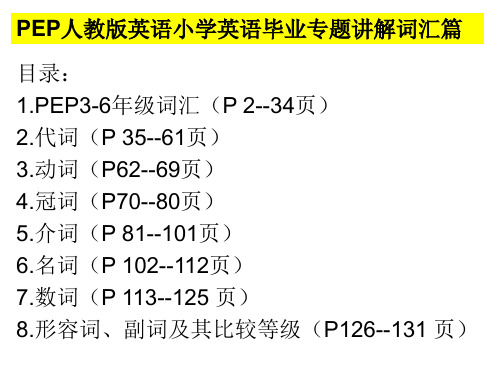
帽子 围巾
手套
鞋
socks coat jacket shirt
袜子
外套 夹克衫 男衬衫
T-shirt sweater pants
T恤衫
毛衣
裤子
shorts skirt dress
短裤
裙子
连衣裙
clothes
衣服
jeans
牛仔裤
near far
in front of behind
在…附近 远的/遥远的 在…前面
forty fifty sixty seventy eighty ninety one hundred one thousand
first
第一
fifth
第五
ninth
第九
…
second third
第二
sixth
第三
seventh
第六
tenth
第七
eleventh
头
头发
脸
眼 耳朵
嘴
tooth nose shoulder elbow arm
牙齿
鼻子
肩膀
肘
胳膊
hand finger leg knee foot toe
手
手指
腿
膝盖
脚 脚趾
stomach skin bone muscle body
胃/肚子
皮肤 骨骼;骨头 肌肉
身体
hat scarf gloves shoes
星期二
Friday
星期三
Saturday
星期四
week
星期五
星期六
星期/周
blue orange
蓝色(的)
black
人教pep版小学英语总复习【基础知识与基础知识】分析详解
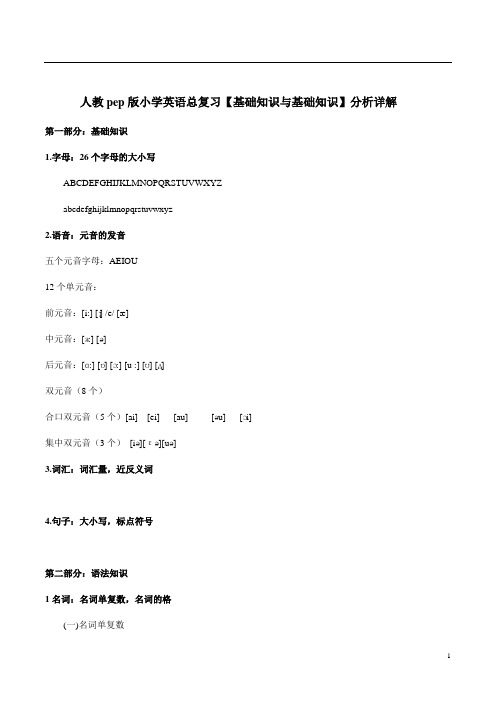
人教pep版小学英语总复习【基础知识与基础知识】分析详解第一部分:基础知识1.字母:26个字母的大小写ABCDEFGHIJKLMNOPQRSTUVWXYZabcdefghijklmnopqrstuvwxyz2.语音:元音的发音五个元音字母:AEIOU12个单元音:前元音:[i:] [ɪ] /e/ [æ]中元音:[ɜ:] [ə]后元音:[ɑ:] [ɒ] [ɔ:] [u :] [ʊ] [ʌ]双元音(8个)合口双元音(5个)[ai] [ei] [au] [əu] [ɔi]集中双元音(3个)[iə][εə][uə]3.词汇:词汇量,近反义词4.句子:大小写,标点符号第二部分:语法知识1名词:名词单复数,名词的格(一)名词单复数一般情况,直接加-s,如:book-books, bag-bags, cat-cats, bed-beds以s. x. sh. ch结尾,加-es,如:bus-buses, box-boxes, brush-brushes, watch-watches以“辅音字母+y”结尾,变y为i, 再加-es,如:family-families, strawberry-strawberries以“f或fe”结尾,变f或fe为v, 再加-es,如:knife-knives不规则名词复数:man-men, woman-women, policeman-policemen, policewoman-policewomen, mouse-micechild-children, foot-feet, tooth-teeth, fish-fish, people-people, Chinese-Chinese, Japanese-Japanese 不可数名词的复数就是原型:paper, juice, water, milk, rice, tea(二)名词的格有生命的东西的名词所有格:a) 单数后加’s 如: Lucy’s ruler my father’s shirtb) 以s 结尾的复数名词后加’如: his friends’bagsc) 不以s 结尾的复数后加’s children’s shoes并列名词中,如果把’s加在最后一个名词后,表示共有, 如:Tom and Mike’s car 汤姆和迈克共有的小汽车要表示所有物不是共有的,应分别在并列名词后加’sTom’s and Mike’s cars 汤姆和麦克各自的小汽车(2)表示无生命东西的名词通常用“of +名词”来表示所有关系:如:a picture of the classroom a map of China2冠词:不定冠词,定冠词种类(1)不定冠词:a / an a unit / an uncle元音开头的可数名词前用an :an egg / an apple / an orange / an eraser / an answer /an ID card / an alarm clock / an actor / an actress / an e-mail /an address / an event / an example / an opera /an houran old man / an interesting book / an exciting sport /an action movie / an art lesson /(2)定冠词:the the egg the plane定冠词的用法:特指某(些)人或某(些)物:The ruler is on the desk.复述上文提到的人或物:He has a sweater. The sweater is new.谈话双方都知道的人或物:The boys aren’t at school.在序数词前:John’s birthday is February the second.用于固定词组中:in the morning / afternoon / evening不用冠词的情况:专有名词前:China is a big country.名词前有定语:this , that , my , your , some, any , no 等:This is my baseball.复数名词表示一类人和事:Monkeys can’t swim. They are teachers.在节日,日期,月份,季节前:Today is Christmas Day. It’s Sunday.一日三餐前:We have breakfast at 6:30.球类棋类运动前:They often play football after class. He plays chess at home. * 但乐器前要用定冠词:I play the guitar very well.学科名称前:My favorite subject is music.在称呼或头衔的名词前:This is Mr Li.固定词组中:at noon at night by bus3代词、形容词、副词1).代词:人称代词,物主代词人称代词物主代词主格宾格第一人称单数I(我)memy(我的)复数we(我们)usour(我们的)第二人称单数you(你)youyour(你的)复数you(你们)youyour(你们的)第三人称单数he(他)himhis(他的)she(她)herher(她的)it(它)itits(它的)复数they(他们/她们/它们)themtheir(他们的/她们的/它们的)2).形容词,副词:比较级,最高级(一)、形容词的比较级1、形容词比较级在句子中的运用:两个事物或人的比较用比较级,比较级后面一般带有单词than。
人教PEP版小学英语六年级毕业复习——冠词的用法

7.Let’s have __ rest for __ while. 8.Mother bought me __ uniform yesterday. 9.I have __ pencil __ (a, the) pencils is red. 10.___(a, the /) sun is shining brightly in __ (a, the, /) sky. 11.__ (a, the) dictionary on __ (a, the) desk is mine. 12.Is __ (the, /) Mary (a, the,/) youngest girl in our class. 13.Can you play (a, an, the, /) violin? 14.We go to school by (a, the, /) bike in (a, an, the) morning every day.
星期一 Monday 星期二 Tuesday
春节 Spring Festival 中秋节 Mid-autumn day
1.冠词有:a 、an 、the 定冠词:the
2.冠词分为:
不定冠词:a、an
冠词的用法:
• a/an 都表示一个 • an 用在单词发音中元音音标开头的单词 • a 用在单词发音中辅音音标开头的单词 • a/an 第一次提到 • the 再次提到
mother is having __ breakfast. My grandmother is watering __ flowers in __ garden and I’m watching __ TV. Look! This is my zone. There is __ beautiful umbrella in my bedroom. I like __ umbrella very much because I bought it in __ Paris. These are all my pr空
- 1、下载文档前请自行甄别文档内容的完整性,平台不提供额外的编辑、内容补充、找答案等附加服务。
- 2、"仅部分预览"的文档,不可在线预览部分如存在完整性等问题,可反馈申请退款(可完整预览的文档不适用该条件!)。
- 3、如文档侵犯您的权益,请联系客服反馈,我们会尽快为您处理(人工客服工作时间:9:00-18:30)。
PEP小学英语毕业总复习资料B.主要句型汇总一、询问姓名:name.1.What's your name? 你叫什么名字?My name is …. 我叫……。
2.What's his name? 他的名字是什么?His name is Mike. 他的名字是麦克。
3.What's her name? 她的名字是什么?Her name is Chen Jie. 她的名字是陈婕。
4.What's its name? 它的名字是什么?Its name is Dong Dong. 它的名字是东东。
小学英语人名翻译[男:Mike(迈克) Wu Yifan(吴一帆)John(约翰) Zhang Peng(张鹏)Nick(尼克) Pete(皮特)Tom(汤姆)Mr Black(布莱克先生)女:Chen Jie(陈洁) Amy(艾米) Sarah(萨拉) Liu Yun(刘芸)Lisa(莉萨)Mary(玛丽) Ann(安) Miss White (怀特小姐) ]二、询问年龄 How old .1.How old are you? 你几岁了?I'm 12. 我十二岁。
2.How old is he? 他几岁了?He is 23. 他23岁。
3.How old is she? 她几岁了?She is 20. 她20岁。
[数字词汇:one一two二three三four四five五six六seven七eight 八nine九ten十eleven 十一twelve 十二thirteen 十三fourteen 十四fifteen 十五sixteen 十六seventeen 十七eighteen 十八nineteen 十九twenty 二十thirty三十forty四十fifty五十sixty六十seventy七十eighty八十ninety 九十 hundred百]三、询问颜色:colour1.What colour is it? 它是什么颜色的?It's yellow and white. 黄白相间。
2.What colour are they? 它们是什么颜色的?They're green. 绿色的。
[颜色词汇:red 红色的yellow 黄色的green 绿色的blue 蓝色的purple 紫色的white 白色的black 黑色的orange 橙色的pink 粉色的brown 棕色的]四、询问时间或日期:What time , When.1.What time is itnow? 现在几点钟?It's nine o'clock. It's time for English class. 九点。
该上英语课了。
It's eight o'clock. It's time to go to bed.) 八点。
该上床睡觉了。
2.What day is ittoday? 今天星期几?It'sMonday.星期一。
[星期词汇:Sunday 星期天Monday 星期一Tuesday星期二Wednesday 星期三Thursday 星期四 Friday 星期五 Saturday 星期六]3.What's the datetoday? 今三是几月几号?It's May 1st今天是五月一日When is yourbirthday? 你的生日是什么时候?It's October 1st, our National Day. 十月一日.国庆节。
[月份词汇:Jan./January一月 Feb./February二月 Mar./March三月Apr./April四月May五月 June六月 July七月Aug./August八月Sept./September 九月Oct./October十月 Nov./November十一月Dec./December十二月][序数词第一至第三十一:first第一 second第二 third第三fourth第四fifth第五sixth第六seventh第七 eighth第八 ninth第九 tenth第十eleventh第十一twevlfth第十二 thirteenth 第十三fourteenth 第十四 fifteenth 第十五sixteenth第十六seventeenth 第十七 eighteenth第十八 nineteenth 第十九twentieth第二十 twenty- first第二十一 twenty-second第二十二 twenty-third 第二十三twenty-fourth第二十四twenty-fifth第二十五 twenty-sixth第二十六twenty-seventh 第二十七twenty-eighth第二十八twenty-ninth第二十九tirtieth 第三十 thirty-first第三十一]4.When do you do morning exercises? 你们什么时候做早锻炼?I usually do morning exercises at 8:30. 我们通常8:30做早锻炼。
5.What do we have on Mondays? 我们星期一上哪些课?We have Chinese, English, math …语文、英语、数学……五、询问方位或地方:Where.1.Where is my toy car? 我的玩具汽车在哪儿?It's here, under the chair. 在这儿.在椅子下面。
2.Where is the canteen? 餐厅在哪儿?It's on the first floor. 在一楼。
3.Where are the keys? 钥匙在哪儿?They're in the door. 在门上。
4.Where is myseat? 我的座位在哪里?It's near thedoor. 在门旁边。
5.Excuse me. Where is the library, please? 对不起.请问图书馆在哪儿?It's near the post office. 在邮局附近。
6.Where are you from? 你从哪儿来?I'm fromChina. 我从中国来。
[China中国 PRC Canada加拿大CAN England 英国UK America美国USA Australia澳大利亚]7.Where does the rain come from? 雨是从哪儿来的?It comes from the clouds. 它是从云层里来的。
[ rain<---- cloud <---- vapour <---- water <---- river ][表示方位的词:in在里面 on在上面 under在下面 behind在后面 near在附近over在上面next to 在旁边in front of在前面east /west /south /north + of在东/西/南/北面 ]六、A.询问数量How many1.How many kites can you see? 你可以看见几只风筝?I can see12.我可以看见十二只风筝。
2.How many crayons do you have? 你有多少支彩笔?I have16.我有十六支。
3.How many people are there in your family? 你家有几个人?Three.三个人。
B.询问价钱How much1.How much is thisdress? 这条连衣裙多少钱?It's ninety-nineyuan. 九十九元。
2.How much are these apples? 这些苹果多少钱?They're thirty-fiveyuan. 三十五元。
3.Can I help you? Yes, how much this dress?你要买点什么吗?是的,这件连衣衣裙多少钱?[数字词汇:one一two二three三four四five五six六seven七eight 八nine九ten十eleven 十一twelve 十二thirteen 十三fourteen 十四fifteen 十五sixteen 十六seventeen 十七eighteen 十八nineteen 十九twenty 二十thirty三十forty四十fifty五十sixty六十seventy七十eighty八十ninety 九十 hundred百]七、“How”问句:How tall身高, How heavy体重, How long长度。
1.How tall areyou? 你有多高?I'm 160 cm tall. I'm taller than you. 我有160厘米。
我比你高。
2.How heavy areyou? 你有多重?I'm 48 kg. You’re heavier than me. 我有48公斤。
你比我重。
3. How long are your legs ?你的腿有多长?76cm76厘米。
4.How do you go toschool? 你怎么上学?[问方式]Usually I go to school on foot. Sometimes I go by bike.我通常步行上学。
有时候骑自行车。
[ always总是usually=often 经常 sometimes有时] 5.How can I get to Zhongshan Park? 我怎么到中山公园去?You can go by the No. 15 bus. 你可以乘坐15路公汽。
Go straight for five minutes. Then turn left. It's on the left.直走五分钟。
然后左转。
公园就在左边。
八、询问身体状况或情绪:feel, matter.1.How do you feel? 你感觉如何?I feelsick. 我觉得不舒服。
How does Chen Jie feel? 陈洁感觉如何?She'stired. 她很疲倦。
[感受词汇:tired疲劳的,累的excited兴奋的angry生气的happy高兴的bored无聊的,烦人的sad 忧伤的,悲伤的]2.What's the matter? 怎么了?My throat is sore. / I have a sore throat.我的喉咙疼。
